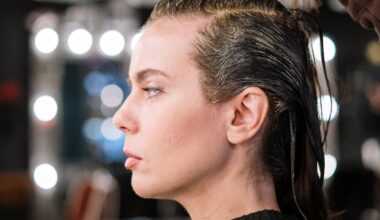Introduction
In the ever-evolving world of hair care, one question remains perennially debated: How often should we shampoo our hair? With so many products, hair types, and expert opinions, it can be challenging to decipher the optimal frequency. This guide aims to demystify the shampooing frequency debate and empower you with knowledge to craft the perfect hair wash routine tailored for your unique locks.
Key Takeaways
- The importance of understanding individual hair needs when determining shampoo frequency.
- General shampooing guidelines for different hair types and lifestyles.
- The specific needs of curly hair and male hair care in the shampooing routine.
- Insights into the shelf life of shampoo products and their proper storage.
- A balanced look at shampooing hair three times a week.
Let’s delve deeper into each segment to uncover the shampooing frequency secrets for healthy and vibrant tresses.
How Often Should You Shampoo Your Hair?
Your hair type, lifestyle, and the products you use are crucial variables in determining your ideal shampooing frequency. It’s essential to listen to your hair and scalp’s needs and adjust your routine accordingly. Let’s explore the factors that will help you decide how often to shampoo:
- Hair Type:
- Oily Hair: If your scalp tends to get oily quickly, you might need to shampoo every day or every other day.
- Dry or Coarse Hair: These hair types can usually go for longer without shampooing, often only requiring a wash 2 to 3 times a week.
- Normal Hair: A balanced scalp allows for a flexible shampooing schedule, typically every 2 to 3 days.
- Lifestyle Factors:
- Active Lifestyle: If you sweat a lot due to physical activity, you might find the need to shampoo more frequently to keep your scalp fresh.
- Product Usage: Frequent use of styling products can necessitate more frequent shampooing to prevent product buildup.
- Scalp Condition:
- Individuals with certain scalp conditions may require a specialized shampooing routine. It’s always best to consult with a dermatologist or a hair care professional for personalized advice.
- Environmental Factors:
- Climate: Living in a humid or polluted environment can affect how often you need to wash your hair.
Adhering to these general guidelines and tweaking your shampoo schedule based on your personal experiences can pave the way for healthier, more manageable hair.
Frequency of Shampooing: Male Hair Care
Men often wonder if their shampooing regimen should differ from that of women. While hair’s fundamental structure remains the same regardless of gender, certain aspects make male hair care unique:
- Hair Length and Style:
- Many men have shorter hairstyles, which can become oily or dirty faster due to the proximity of hair to the scalp. Therefore, more frequent washing might be necessary.
- Longer styles, on the other hand, might benefit from less frequent shampooing to maintain natural oils and prevent dryness.
- Scalp Health:
- Dandruff or itchy scalp is a common concern for many men. Choosing the right anti-dandruff shampoo and knowing when to use it is crucial. It’s not always about frequency but the right product.
- Daily Activities:
- If you’re someone who engages in daily workouts or outdoor activities, sweat and dirt accumulation might prompt a daily rinse or shampoo. However, remember that overwashing can strip natural oils, so find your balance.
- Hair Products:
- Men’s hairstyling products like pomades, gels, and waxes might necessitate more frequent washing to avoid buildup and residue.
- Genetics:
- Believe it or not, how oily or dry your hair gets can be a genetic trait. If the men in your family tend to have oilier hair, you might too.
In summary, while men’s hair care has its peculiarities, the fundamental principle remains: Understand your hair and scalp’s needs, and adjust your shampooing routine accordingly. There’s no one-size-fits-all, so it’s about striking the right balance for you.
Shampooing Curly Hair: Special Considerations
Curly hair, with its unique texture and structure, presents its own set of challenges and rewards. The twists and turns of curls can prevent natural oils from the scalp from traveling down the hair shaft, often making curly hair more susceptible to dryness. Thus, shampooing requires a nuanced approach.
- Understanding Curly Hair’s Needs:
- Because of the aforementioned dryness, it’s usually not advisable for individuals with curly hair to shampoo daily. Overwashing can exacerbate dryness and lead to frizz.
- Moisture is Key:
- When choosing a shampoo, curly-haired individuals should lean towards hydrating formulas. These formulas help to replenish moisture, ensuring that curls remain defined and bouncy.
- Technique Matters:
- It’s not just about how often you shampoo, but how you do it. Gentle massaging of the scalp without aggressive rubbing of the hair prevents breakage and promotes healthy curls.
- Consider Co-Washing:
- Some curly-haired folks swear by co-washing, which involves using a conditioner or a dedicated co-wash product instead of shampoo. This method cleanses the hair without stripping it of its natural oils.
- Listen to Your Curls:
- While general guidelines are helpful, every curl pattern is unique. Some might require shampooing once a week, while others might benefit from a bi-weekly routine. It’s all about observation and adjustment.
Curly hair is a beautiful asset, and with the right care, it can be a source of pride and confidence. Embrace your curls, understand their needs, and tailor your shampooing routine to bring out their best.
Balancing Act: Shampooing Frequency for Different Hair Types
Just as everyone has a unique fingerprint, our hair types also differ significantly. Hence, the “one size fits all” rule doesn’t apply when it comes to shampooing. Here’s a guide to help you find that sweet spot for your specific hair type:
- Oily Hair:
- Frequency: Most people with oily hair feel the need to shampoo daily. However, it’s essential to ensure you’re not over-stripping the hair.
- Tip: Use a lightweight, balancing shampoo designed for oily hair. Avoid overly hydrating products that can weigh hair down.
- Dry or Coarse Hair:
- Frequency: 2 to 3 times a week is often enough.
- Tip: Look for shampoos labeled “moisturizing” or “hydrating.” A weekly deep-conditioning treatment can also work wonders.
- Normal Hair:
- Frequency: Every other day or every third day often works well. Adjust based on how your hair feels.
- Tip: Use a balanced shampoo that doesn’t overly moisturize or strip oils.
- Fine Hair:
- Frequency: This hair type can become oily quickly but is also prone to damage. Consider shampooing every other day and adjust as needed.
- Tip: Volumizing shampoos can be beneficial for adding body.
- Thick Hair:
- Frequency: 2 to 4 times a week is a good starting point.
- Tip: Detangle your hair before shampooing to prevent breakage. Using a hydrating shampoo and conditioner can help manage and maintain thick locks.
- Color-treated Hair:
- Frequency: To maintain color vibrancy, consider shampooing 2 to 3 times a week.
- Tip: Always opt for color-safe shampoos and conditioners. Cold water rinses can also help in preserving the color.
Understanding your individual hair needs is pivotal. While the above are general guidelines, personal experiences and results will always be the best indicator of how often to shampoo. Remember, healthy hair doesn’t just depend on shampoo frequency but also on the products used and overall hair care practices.
How Long Does Shampoo Last?
Let’s get straight into an often overlooked aspect of hair care: the shelf life of shampoo. Just like food products, cosmetic products, including shampoos, have an expiration date, and using them post this date can be less effective or, in some cases, detrimental.
- Expiry Dates – An Overview:
- Generally, unopened shampoos can last between 1 to 3 years, depending on the ingredients and preservatives used. However, once opened, it’s best to use them within 12 to 18 months.
- Why Should You Care?
- An expired shampoo might not only lose its efficacy but can also develop harmful bacteria, leading to scalp infections or irritations.
- Signs Your Shampoo is Past its Prime:
- Change in Smell: A rancid or off-putting odor is a clear sign.
- Change in Texture: If the shampoo separates or develops an unusual consistency, it’s time to toss it.
- Color Shift: Any noticeable color change indicates the shampoo’s gone bad.
- Storage Matters:
- Keeping your shampoo bottle in a cool, dry place away from direct sunlight can prolong its shelf life. Humidity and heat can break down the formula, making it less effective and shortening its lifespan.
- Eco-friendly Tip:
- Before throwing away an expired shampoo bottle, consider recycling the bottle. Many brands now use recyclable packaging, which is a win for the environment.
In conclusion, while it might be tempting to use up that old bottle of shampoo sitting at the back of your bathroom cabinet, it’s essential to ensure it’s still good to use. Taking note of expiration dates and being aware of changes in your products ensures that your hair receives optimal care and avoids potential scalp issues.
Shampooing Hair Three Times a Week: Pros and Cons
A common question that hairstylists often face is about the golden number: “Is shampooing three times a week the right amount for me?” While it might seem arbitrary, there are compelling arguments for and against this frequency. Let’s untangle this strand by strand:
Pros of Shampooing Hair Thrice a Week:
- Balanced Oil Production:
- Shampooing three times a week can help regulate the scalp’s oil production, preventing it from being too oily or too dry. This is especially beneficial for those with combination hair (oily roots and dry ends).
- Reduced Product Build-up:
- If you frequently use styling products, shampooing three times a week can effectively remove product build-up, ensuring your scalp remains healthy and your hair lively.
- Less Exposure to Chemicals:
- By not shampooing daily, you limit your scalp’s exposure to potential irritants, which can be particularly beneficial for those using non-natural shampoos.
- Improved Hair Texture:
- Less frequent shampooing allows natural oils to coat the hair, making it softer and less prone to breakage.
Cons of Shampooing Hair Thrice a Week:
- Not Suitable for Extremely Oily Hair:
- People with super oily hair might find their hair becoming limp or greasy if they wait too long between washes.
- Potential for Dandruff:
- For some, infrequent shampooing can lead to a dry scalp, which in turn can cause dandruff or itchiness.
- May Not Suit Active Lifestyles:
- If you’re someone who sweats a lot due to physical activity, waiting for two days between shampoos might not feel refreshing.
- Hair Styling Issues:
- Some hairstyles or looks might require freshly washed hair, so you might have to adjust your hair regimen accordingly.
Final Thoughts: The optimal shampooing frequency is deeply personal and depends on various factors such as hair type, lifestyle, and personal preferences. While shampooing thrice a week might be a sweet spot for many, it’s essential to listen to your hair and adjust as needed. Remember, your hair will often give you signs, be it through excessive dryness, oiliness, or scalp issues. Paying heed to these signs is key to determining the best routine for your hair.
Conclusion
Deciding how often to shampoo is a hot topic in hair care circles, and the debate isn’t one-size-fits-all. Like skincare, hair care is deeply individualistic. Factors like your hair type, texture, lifestyle, and even the climate you live in can influence the perfect shampooing frequency for you.
To navigate the “Shampooing Frequency Debate,” you’ll want to:
- Know Your Hair:
- Understanding your hair type and its specific needs will guide you in deciding how often to cleanse. Curly hair, for instance, tends to dry out quickly and may not require frequent shampooing. On the other hand, fine, straight hair may appear oily faster and could benefit from more regular washes.
- Consider Your Lifestyle:
- Your daily activities play a role too. A workout junkie might need to shampoo more often than someone with a sedentary lifestyle.
- Stay Informed, But Trust Your Instincts:
- While it’s beneficial to know general guidelines, no one knows your hair better than you. If it feels dirty or oily, it might be time for a wash, regardless of “rules.”
- Use Quality Products:
- Ensure your shampoo doesn’t have harsh chemicals and suits your hair type. And don’t forget about the shelf life of your shampoo. Using expired products can harm your hair and scalp.
- Be Flexible:
- As seasons change, so might your hair’s needs. It’s always okay to adjust your routine as necessary.
Remember, the goal is healthy, vibrant locks. Whether you achieve that by shampooing daily, thrice a week, or even once a week, the best routine is the one that leaves your hair feeling its best.
Additional Resources
For those eager to dive even deeper into the world of hair care, I recommend:
- Books:
- “The Science of Black Hair” by Audrey Davis-Sivasothy: A comprehensive guide to textured hair care.
- “Curly Girl: The Handbook” by Lorraine Massey: A must-read for all curly-haired beauties.
- Websites:
- NaturallyCurly.com: A vast resource for those with wavy, curly, and coily hair.
- The Beauty Brains: A team of cosmetic scientists who break down the science behind beauty products.
- Experts:
- Consider booking a consultation with a trichologist, a specialist in scalp and hair care. They can provide insights tailored to your specific needs.
Happy Hair Days are ahead, and knowledge is your best tool. Listen to your hair, give it the love it deserves, and it will undoubtedly shine in return.





